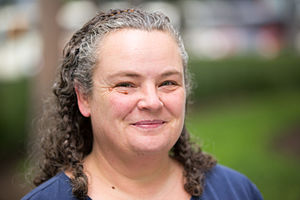Affiliate-selected Board seats/2016/Nominations/Leigh Thelmadatter/ml
പേര്:

- Leigh Ann Thelmadatter
ഉപയോക്തൃനാമം:
Questions for all candidates; Questions for this individual candidate that do not apply to other candidates
പ്രസ്താവന
Despite being an organization whose focus is education, we have yet to have anyone on the board who has made a career of teaching students in the classroom. Administrative experience is good, and I am forever grateful for the administrative support Wiki Learning has, but some of recent events are way too similar to what I have experienced as a teacher who uses technology. As I noted in Wikimedia-l, there is a huge disconnect between those that make software and similar technologies and end users. Despite decades of research and experience, in many ways, educational institutions, especially higher ed humanities, do not adapt to technology well, either rejecting it outright, or looking for a magical program/hardware that is going to solve all the department's problems. One problem is that programmers are as aware of what professors and students need about as much as we can code. The other problem, which I see both at universities and the WMF, is the tendency to run towards whatever technological fad exists, uncritically believing the hype and forgetting that technology serves the mission. So many universities have wasted millions of dollars only to find after the fact that what they bought did not fit their needs.
The priority of the Board and the future ED must be to keep the mission first, not to somehow keep up with the Silicon Valley Joneses. It also means that priority must be given to those whose work creates and maintains Wikipedia and other projects. People do not donate money for the WMF to create gadgets, they do it for free online information, and yes, that is primarily Wikipedia. I'm in favor of exploring new technologies to fit with this, especially finishing work on Visual Editor, which has just recently become good enough to be useful, but not perfect, and there needs to be a lot of standardization work done (e.g. making infoboxes tranferable to other language wikis for translation projects). None of this is glamourous work, but it needs to be done to avoid rot.
I am adding my name as an affiliates' candidate, even though I am not a member of a chapter or thematic group. I, however, am one of the founders of the user group Wiki Learning Tec de Monterrey, which is both an affiliate and an education program. Since our inception in 2011, we have been challenging assumptions about how educational professionals and students can/should participate in Wikimedia and the global Wikimedia community. I would like to continue to do this because we have only just begun to explore what user groups have to offer the movement, aside from being "proto-chapters" or "proto-thematic groups." User groups offer groups of people who are interested in contributing, but whose situation may not be condusive to chapter and user group status.
Résumé
Leigh Thelmadatter
Wikipedian since 2007
Involved in F2F Wikimedia activities starting in 2009. My first major project was recruiting the Museo de Arte Popular into Wikimedia, initially under GLAM, with Mexico's first editathon under Wikimedia México. From then until 2011, my interests shifted more towards Wikimedia in education.
I am a professor of English-as-a-second-language (MA U of Arizona) at the Instituto Tecnológico y Estudios Superiores de Monterrey (Tec de Monterrey), México's largest private university with regularly gives the state-financed UNAM a run for its money in rankings. We have 32 campuses in most parts of Mexico, which gives us a unique ability to spread Wikimedia activities outside Mexico City and nearby satellite cities.
2007 I taught the first class at Tec de Monterrey (Toluca Campus) using Wikipedia, before there was a Wikipedia Education program, but this experience was not repeated until I was at the Mexico City campus.
2011 The first organization attempt occurred at Tec de Monterrey, with a student group. Started with 7 students.
2012 Wikimedia activities became an option for International Baccalaureate students seeking to fulfil Community, Action, Service hours. Presentation of our experimentation with this and work in classes, especially translation of articles at Wikimania in Washington DC.
2013 Wikimedia becomes an option for students needed to fulfil "servico social", community service hours requires of all undergraduate students in Mexico. Student participation grows to about 20+ per semester.
2013 The student group is reformed to a campus educational program for the sake of stability, headed by myself and Lourdes Epstein. Application to become a user group is begun. Under the name of Wiki Learning, the program gets the attention of Tec de Monterrey authorities at the main campus.
2013 to present - Wiki Learning gives presentations and training sessions to professors and others at conferences and workshops.
2015 Tec de Monterrey implements "Semana i" (I Week), a week set aside for students to dedicate themselves to a project instead of going to classes. Groups of students work with Wikimedia in March 2015 and September 2015, at three campuses, Mexico City, State of Mexico and Santa Fe. The next Semana i is scheduled for September 2016, which will have four groups doing distinct projects under four different professors.
This is not a traditional resume for good reason. I did not do all this work by myself and there is no way to separate what I have done from what my colleagues have. We have kept extensive documentation in Outreach wiki.
യോഗ്യത
Wikimedia NYC has offered to support "non-traditional" affiliate candidates. I do believe that user group affiliates as active as ours should have at least the same rights as chapter/thematic group affiliates with far less activity.
അംഗീകാരം
- At the Wikimedia NYC March 2016 public meeting, attendees took part in an open vote to endorse Leigh's participation as a candidate in this election. This is part of our chapter's policy to encourage a more diverse and more transparent process for the WMF board elections.--Pharos (talk) 17:40, 18 March 2016 (UTC)